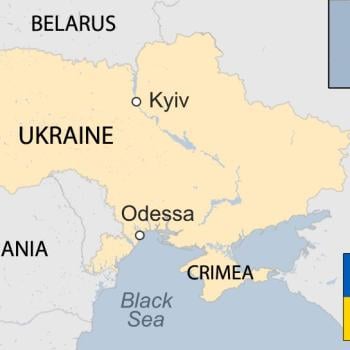 Roger Johnson, president of the National Farmers Union, blasted President Donald Trump in a very frank radio interview yesterday. The main take from what he said is that China is already a “lost market” for American farmers due to Trump’s tariff war with China and that it will take “decades” to get it back if that is even possible. Johnson concluded, “It’s going to take much different behavior from future presidents in order to repair this damage.”
Roger Johnson, president of the National Farmers Union, blasted President Donald Trump in a very frank radio interview yesterday. The main take from what he said is that China is already a “lost market” for American farmers due to Trump’s tariff war with China and that it will take “decades” to get it back if that is even possible. Johnson concluded, “It’s going to take much different behavior from future presidents in order to repair this damage.”
The interview was on KFGO radio in Fargo, North Dakota. This farm union represents 200,000 family farms, ranches, and fishing enterprises in 33 states in the U.S. Johnson, it should be said, is also a registered Democrat voter.
IMO, Johnson spewed out a lot of common sense and wisdom in his remarks about more than farm products. He said of Trump’s tariff war imposed unwillingly on China, “I would … argue that it would be far more effective if we did it with the rest of world, instead of first ticking off the rest of the world and then trying to do it all by ourself.” Johnson further said of the self-proclaimed Great Deal Maker that he has “offended the leaders of pretty much every ally we have on earth.”
What’s happening is that China is taking its business to buy needed food products elsewhere. That’s why Johnson says Trump’s tariffs are “very harmful to agriculture; all the trade disruption has been enormously damaging” to U.S. farmers.
Johnson continued, “a lot of folks believe that China needs to be held accountable.” Yet he also said, “You’re increasingly going to find people who sort of say, ‘This was just a mistake. This isn’t the way you solve a real problem. It’s just making things worse.’”
Johnson explained, “I don’t think you can expect to make the fundamental changes that are being asked of China while every other day you’re offending them, you’re forcing them to lose face. No country’s going to make changes when they’re embarrassed along the way. That’s just not how you do things.” So much for the man in the book, The Art of the Deal.
Trump is always saying, “I love our farmers.” Yeah, sure. Let’s see now, the Environmental Protection Administration (EPA), following President Trump’s orders, recently rolled back regulations regarding the burning of methane gas at oil wells. I lived in Texas for nearly forty years and not far from the Houston Ship Channel where all the oil refineries are. I always wondered why the federal government wouldn’t stop those oil companies from burning all that methane at their wells which all of us Texans had to breathe.
This wasteful burning of methane at oil wells makes an enormous contribution to our U.S. emissions footprint. Trump also granted waivers to 31 oil fineries to not have to produce corn-based ethanol anymore, which (I think) has already caused the price of corn to drop. Farmers are feeling less and less loved from this White House.
Due to the imbalance in exports between the U.S. and China’s years of misdeeds toward U.S. intellectual property of companies that do business in China, Trump slaps China with big tariffs, like taxes, on Chinese imports to the U.S. China naturally retaliates by doing the same, in this case, largely against U.S. farm products exported to China, such as soybeans and grains. Trump foolishly says, “tariff wars are easy to win.” Easy for who? It takes two to tango. Almost all authorities disagree.
Midwestern farmers were a big part of Trump winning the presidential election in 2016. KFGO’s Joel Heitkamp said of his shocking interview with Johnson, “You can see how mad AG [agriculture] producers are when they see that big oil got the exemptions … it’s like the light finally got turned on and some of these guys woke up.”
Johnson said net farm income is down half what it was six years ago. He lamented, “This is really tough. We’re in a really, really difficult spot right now.” Yeah, and U.S. farmers having been suffering from years of drought. If matters continue like this much longer with Trump’s tariffs, a lot of farm families will go out of business while the big farm operations will survive.












